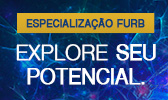 |
PPGBIO IN ENGLISH
Biodiversity Graduate Program (PPGBio) at FURB emphasizes the study of the biological diversity, whose research focuses on four main domains: description of the biological diversity, investigation of phylogenetic relationships for some taxonomic groups, determination of spatial and temporal distribution of species, and the potential use of biodiversity to generate new products and processes. PPGBio is focused on research, teaching and outreach activities to insert its action into the local, regional, and national social reality. The PPGBio at FURB offers only the Master degree at this moment. The main goal of the Program is “To train researchers and professionals with capacity to generate and disseminate knowledge about biodiversity and its multiple uses using a comparative and holistic approach”. Specific goals of the Program are:
·Train researchers with scientific and technical skills using an holistic approach for analyses, conservation, monitoring and use of the biodiversity,
·Generate knowledge on Brazilian biodiversity, especially in the state of Santa Catarina, that can be used for conservation purposes, sustainable use of biodiversity and development of public policies,
·Develop professionals with skills in prospecting biodiversity to generate processes, products and services applied to benefit society,
·Capacitate students to develop interdisciplinary research and innovation, with an international perspective to solve environmental problems,
·Train students for teaching in multidisciplinary areas of Biological Sciences.
Area of InterestBiodiversity. This area has the goal to capacitate students with a multidisciplinary academic scope and to develop research and teaching skills in the distinct areas on the study of biodiversity.
Research linesSistematics and Biological Diversity– This line of research focuses on studies on systematics (taxonomy and phylogeny) of fungi, protist, plants, and animals, based on morphological and genetic characters, and ecological and biogeographic studies.
Conservation and Sustainable use of the Biodiversity – This line of research focuses on studies related to biodiversity conservation, the impact of pollutants on the biodiversity, the identification and use of genetic and biochemical resources with potential sustainable use, comprising basic and applied multidisciplinar research involving molecular, cellular and physiological aspects of biodiversity.
Program term, period and localProgram term: 2 years (4 semesters)
Total Courses hours: 450 hours
Number of vacancies: 15
Courses day: Courses will be taught preferentially on Fridays (morning and afternoon)
Courses local: Campus I – Blumenau, Brazil.
Proof of English Proficiency: the exam in English proficiency is taken by students at FURB Idiomas. English score reports from other Universities or official agencies (TOEFL, Cambridge, others) are accepted after evaluation by the Program Committee.
Required CoursesBiostatistics – 3 credits - 45 class hours
Types of Variables; Samping Theory; Descriptive Statistics; Probabilty Theory; Probability Distribution; Test of Hypothesis (Parametric and non-parametric); Regression and Correlation; Use of Softwares for Statistical Analysis.
Biological Diversity – 3 credits – 45 class hours
What is biodiversity? Levels of biological diversity: from genes to ecossystems; Legislation of sampling and international protologues; Measuring biodiversity; Biological Collections; Causes and consequences of biodiversity loss. Measurement of monitoring and preservation of biological diversity.
Community Ecology – 3 credits – 45 class hours
Concepts and definitions of biological communities; organization and structure of communities; notions of guilds and functional structure of communities (functional groups). Communities organization with focus on descriptive, comparative, and experimental approaches; interspecific relationships: predation, parasitism, competition, chance and co-evolution. Environmental patterns on the organization of communities. Phylogenetic patterns in metacommunities. Phylogenetic tree in ecology. Metrics for structure and phylogenetic diversity. Phylogenetic structure of communities.
Principles of Phylogenetic Systematics – 3 credits – 45 class hours
Schools of Systematic: Classic, Evolutionary, Phenetics, and Phylogenetic. The role of Willi Hennig on the history of Systematics. Basic concepts in Phylogenetic Systematics: homology, homoplasy, simplsiomorphies, sinapomorphies, monophyletic, paraphyletic and polyphyletic groups. Cladograms. Methods in Phylogenetic Systematics: caracters and caracters state, homology, polarization and tree rooting. Phylogenetic reconstruction using molecular data. Methods to estimate phylogenetic trees: parcimony, maximum likelihood, Bayesian inference. Softwares in Phylogenetic Systematics.
Fundaments of Bioprospection – 3 credits – 45 class hours
Bioprospection: concepts and legislation; Methods of bioprospection of natural products; prospection of insects, plants, and microrganisms; bioethics, sustainable vs non-sustainable use of biodiversity; participation of traditional societies during bioprospection; intelecutal property and technology transfer.
Seminars – 1 credit - 15 class hours
Transdisciplinary space for the presentation and discussion of specific topics of interest to students, focused on the program's research lines, with the exchange of experience and socialization of proposals, activities and materials between faculty members and students.
Anthropogenic impacts in the biodiversity – 3 credits – 45 class hours
Anthropic-derived impacts on ecosystems: deforestation; change of landscapes; impacts on habitats, species performance, population dynamics and ecological interactions; Changes and losses of genetic diversity; Generation, source and dynamics of pollutants of anthropogenic origin; Negative effects of pollutants on biodiversity; Methods and means for environmental monitoring and risk assessment.
Elective courses
Thesis
The Digital Library of Thesis and Dissertations of FURB harbors PDF copies of thesis and dissertations of all Graduate Programs offered at FURB.
Link: furb.br/bibliotecadigital
Social MediasThe social medias of PPGBio/FURB are used as a channel of communication with students, faculty members, former students and community.
Contact
PPGBio – Biodiversity Graduate Program
Coordinator: Dr. André Luís de Gasper
Contact
Campus I – Room S-301
+55 (47) 3321-0637
Email: ppgbio@furb.br
|





